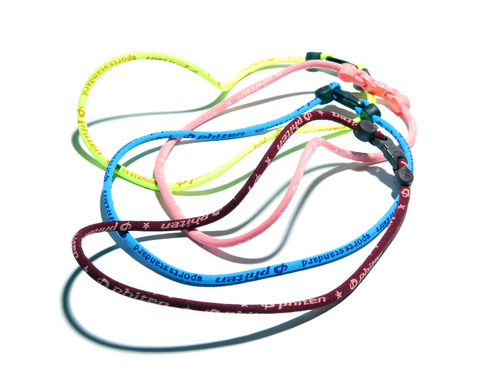Major league baseball players can't be wrong. Or at least that's what some of their fans think. All summer, an increasing number of professional ballplayers have been wearing necklaces and bracelets embedded with titanium for their supposed energy-boosting properties. Now their fans have begun to wear them, too.
Greg Benoit, 23, an amateur center fielder in Anaheim, California, learned about the necklaces, made by a Japanese company, when he saw his cousin Joaquin Benoit, a pitcher for the Texas Rangers, wearing one last year.
"Then when I saw guys like Randy Johnson, Curt Schilling and a lot of the World Series Champion Boston Red Sox wearing it, I had to ask about it," said Benoit, who now owns two necklaces and two bracelets he bought at a Phiten store in Torrance, California.

"The guys in the majors are the ones doing what we want to do. They're superstar pro athletes, and we want to be superstar athletes, so if they have it, we'll try it."
Phiten, the company that makes the necklaces and bracelets -- nylon strands embedded with titanium -- claims on its Web site that they produce an electrical charge that enhances the body's "energy management system, increasing the capacity of every cell."
The absence of any scientific evidence to bolster the company's claim seems not to have slowed sales. This month alone, Phiten says, it has sold 25,000 necklaces and bracelets, which retail for US$23 and US$15 respectively, in the US. That is more than seven times the 3,500 sold nationwide in April.

But sports medicine experts doubt that the thousands of new customers are getting what they pay for.
"We have a long history in our society of looking for quick fixes," said Michael Voight, an exercise physiologist at the University of Southern California who also advises five of the university's sports teams. "Athletes are bombarded with images of these necklaces on TV and in print media, so they assume it works. That kind of exposure can have a very profound psychological effect and the resulting psychosomatic feelings cannot be underestimated."
Titanium products appeal not only to athletes like Greg Benoit but also to ordinary exercisers, who hope they will make everyday workouts easier. Some people think of them as a kind of alternative medicine that assuages their aches and makes them feel better.
Clayton Everline, 27, of Short Hills, New Jersey, has been wearing a titanium necklace since friends recommended it a few years ago. "Every time I wear the necklace or another Phiten accessory, I do perform better," said Everline, a third-year resident at St Michael's Medical Center in Newark. "I surf and lift weights. I attribute my improvement in those activities to Phiten."
At first he wore the necklace only at the gym. But soon he stopped taking it off after workouts, and even took to wearing a Phiten T-shirt under his hospital scrubs and has observed an effect at work, too. "I feel an increased blood flow throughout the day," he said.
How are the products supposed to work?
According to Phiten, a water-soluble form of the element titanium is given an electrical charge. After processing, the company says the special titanium can make the bioelectric currents in people flow more efficiently, increasing energy levels and stamina, said Joe Furuhata, a Phiten spokesman.
Physicians do not buy the idea. Dr David Baron, chairman of family medicine at Santa Monica-UCLA Medical Center, said Phiten's claims are based on wrong assumptions about the electrical energy in living things.
"The human body absolutely generates certain electrical fields," he said. But that does not mean that those fields can be influenced by charged titanium or even if they could, that it would have any effect on a person's energy level, he said.
Alice Ishikawa, 63, a hairstylist from Gardena, California, a few years ago started wrapping Phiten titanium athletic tape around her wrists, to alleviate symptoms of carpal tunnel syndrome. Later she bought a black and white necklace and started wearing it to the gym and found that it had many virtues.
"I work out five days a week," said Ishikawa, who goes to a Curves gym. "I have felt a significant difference as I've worn the necklace -- just an overall sense of wellness."
Earlier this month, to deal with her arthritis pain, Ishikawa tripled up, donning two bracelets and a necklace. She said her symptoms have lessened. Such testimonials do not amount to evidence that there any physiological effects.
"There is no real science behind this and many other gimmicks that surface from time to time," said Roland Carlstedt, a sports psychologist and the chairman of the American Board of Sport Psychology. "Lack of objective proof may be irrelevant to susceptible and superstitious athletes who are very prone to the placebo effect."
Other experts agree that the titanium jewelry may provide a placebo effect. Jeffrey Wildfogel, a professor of psychology at Stanford University, said that when athletes put their faith in the necklaces, it can affect their performance. "If you believe that you're going to do well in your head, your preparation will be done in a confident manner," Wildfogel said.

US President Donald Trump may have hoped for an impromptu talk with his old friend Kim Jong-un during a recent trip to Asia, but analysts say the increasingly emboldened North Korean despot had few good reasons to join the photo-op. Trump sent repeated overtures to Kim during his barnstorming tour of Asia, saying he was “100 percent” open to a meeting and even bucking decades of US policy by conceding that North Korea was “sort of a nuclear power.” But Pyongyang kept mum on the invitation, instead firing off missiles and sending its foreign minister to Russia and Belarus, with whom it

When Taiwan was battered by storms this summer, the only crumb of comfort I could take was knowing that some advice I’d drafted several weeks earlier had been correct. Regarding the Southern Cross-Island Highway (南橫公路), a spectacular high-elevation route connecting Taiwan’s southwest with the country’s southeast, I’d written: “The precarious existence of this road cannot be overstated; those hoping to drive or ride all the way across should have a backup plan.” As this article was going to press, the middle section of the highway, between Meishankou (梅山口) in Kaohsiung and Siangyang (向陽) in Taitung County, was still closed to outsiders

Many people noticed the flood of pro-China propaganda across a number of venues in recent weeks that looks like a coordinated assault on US Taiwan policy. It does look like an effort intended to influence the US before the meeting between US President Donald Trump and Chinese dictator Xi Jinping (習近平) over the weekend. Jennifer Kavanagh’s piece in the New York Times in September appears to be the opening strike of the current campaign. She followed up last week in the Lowy Interpreter, blaming the US for causing the PRC to escalate in the Philippines and Taiwan, saying that as

The Chinese Communist Party (CCP) has a dystopian, radical and dangerous conception of itself. Few are aware of this very fundamental difference between how they view power and how the rest of the world does. Even those of us who have lived in China sometimes fall back into the trap of viewing it through the lens of the power relationships common throughout the rest of the world, instead of understanding the CCP as it conceives of itself. Broadly speaking, the concepts of the people, race, culture, civilization, nation, government and religion are separate, though often overlapping and intertwined. A government